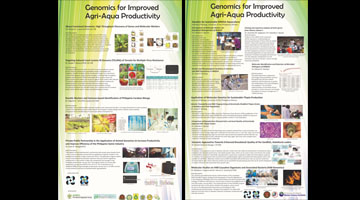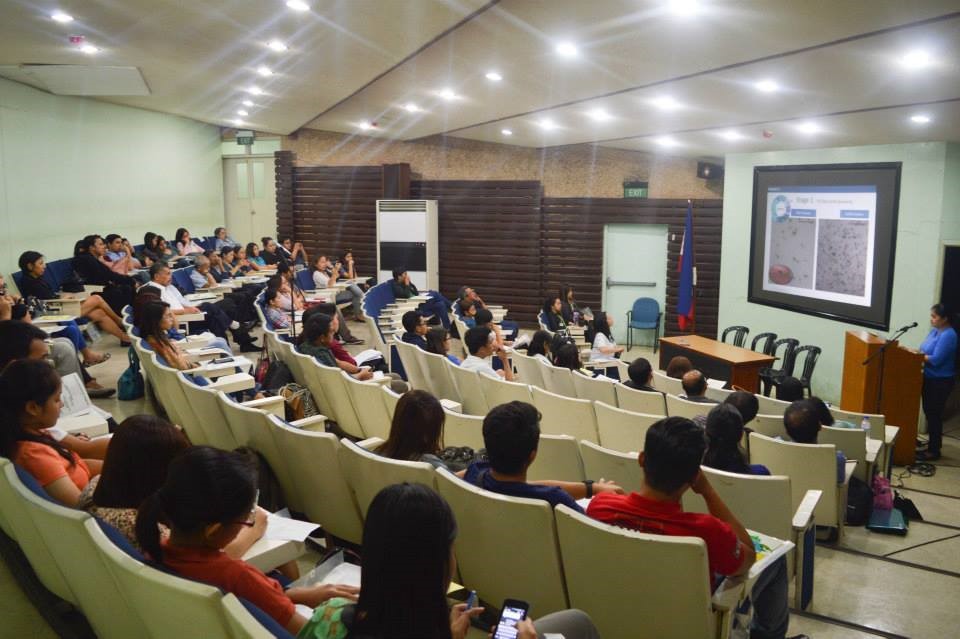 The Philippine Council for Agriculture, Aquatic and Natural Resources Research and Development (PCAARRD) took part in this year’s National Biotechnology Week Celebration held on November 24–28 at CHED Headquarters, University of the Philippines (UP) Campus, Diliman, Quezon City.
The Philippine Council for Agriculture, Aquatic and Natural Resources Research and Development (PCAARRD) took part in this year’s National Biotechnology Week Celebration held on November 24–28 at CHED Headquarters, University of the Philippines (UP) Campus, Diliman, Quezon City.
With the theme “Edukasyon sa Bioteknolohiya: Pagyamanin para sa Kinabukasan Natin,” the week-long event highlighted the importance of education in promoting biotechnology and disseminating information about its role in food production, food security, and hunger alleviation.
The event underscored the need to beef up biotechnology-related efforts in support of education, to capacitate future leaders in the said field.
Several students from UP Los Baños (UPLB), Central Luzon State University (CLSU), and Visayas State University (VSU) were given scholarship grants during the opening ceremonies as the Department of Agriculture launched its Biotechnology Scholarship Program.
PCAARRD, for its part, showcased its ongoing genomics projects on crops, livestock, marine, and aquaculture in an exhibit which ran for a week. Dubbed as “Agri-Aqua Genomics for Improved Productivity,” the Council featured the background, status, and expected outputs of its eight funded projects on genomics.
PCAARRD also organized the S&T Forum on Agri-Aqua Genomics which was held on November 26 at DOST-ICT Office, UP Campus, Diliman, Quezon City.
 Project leaders from UPLB, UPD, VSU, UP Marine Science Institute, and Philippine Carabao Center presented the accomplishments and status of each project.
Project leaders from UPLB, UPD, VSU, UP Marine Science Institute, and Philippine Carabao Center presented the accomplishments and status of each project.
Divided into two parts, the forum focused on the discussion of genomics projects in aquaculture and agriculture.
Projects on aquaculture as discussed include Genomic Approaches towards Enhanced Broodstock Quality of Sandfish (Holothuria scabra); Molecular Studies on Harmful Algal Bloom (HAB) Causative Organisms and Associated Bacteria; Genetics for Sustainable Milkfish Aquaculture; and Genetic Traceability and DNA Fingerprinting of Genetically Improved Tilapia Strains in Hatchery and Feral Population.
The genomics projects on agriculture, on the other hand, include Abaca Functional Genomics: High Throughput Discovery of Genes and Molecular Markers; Targeting Induced Local Lesions IN Genome (TILLING) of Tomato for Multiple Virus Resistance; Genetic Markers and Immuno-based Identification of Philippine ‘Carabao’ Mango;and Private-Public Partnership in the Application of Animal Genomics to Increase Productivity and Improve Efficiency of the Philippine Swine Industry.
The forum was participated by about 80 experts, researchers, students, and representatives from the private sector.
Genomics technology uses tools to sequence, assemble, and analyze the function and genetic control of target genes. Molecular markers are established and selected for use in targeted and precise breeding. It is considered significant and useful in agriculture and aquatic sectors towards increasing productivity, and conserving and managing genetic resources, among many other applications.
PCAARRD’s support for genomics, is only one of the many initiatives of the Council in keeping with the first and foremost of the outcomes committed by DOST: “Science based know-how and tools that enable the agriculture sector to raise productivity to world class standards.”
